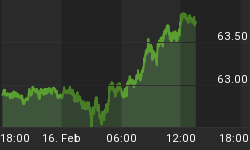Several weeks ago we had perfect alignment of our sentiment indicators, and since that time, the bounce has come, but it has come on lackluster volume. Of note, in the past 5 years, there have been only two other times when all the sentiment indicators have lined like two weeks ago, and this was in July, 2006 and the March, 2009 bottom.
Figure 1 is a weekly chart of the S&P500, which shows the composite sentiment indicator in the middle panel. The indicator is constructed from the "Dumb Money" and "Smart Money" indicators, Rydex asset data, and InsiderScore total market value of insider buying and selling shown in the weekly round up on sentiment. 11 unique data points are utilized. The 2006 and 2009 bottoms are highlighted.
Figure 1. Composite Sentiment Indicator
Volume bars with a 52 week average (black line) are in the lower panel. The 2006 and 2009 bottoms are noteworthy for their above average volume - in terms of both selling (red bars) and buying (green bars). In the current situation, volume may be greater but it is shrinking (down sloping moving average) and certainly doesn't exceed the average.
There is no question that the price action over the past 2 weeks has been good, but volume remains a problem putting the sustainability of this rally into question. To put it another way, it appears that stocks are for renting not owning.
















